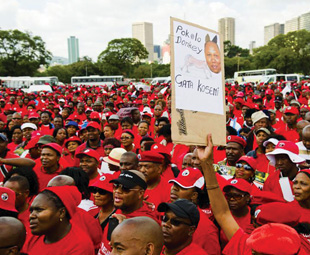Are we in trouble?

Regular FOCUS readers know that I am the eternal optimist. But right now, as I pen this column, I am a tad concerned. Not hysterical, mind you. But a tiny little bit worried …
If you read this magazine last month (and I certainly hope you did otherwise you would have missed out on some Really Great Stuff), you will think that I have gone nuts.
That’s because last month I was calling for a positive sentiment within our industry. I was saying that I was so tired of being surrounded by doom and gloom.
But, as I write this, I could be sliding down the slippery slope into the mire of doom and gloom. For two reasons: the ailing rand and the strikes within our industry.
Now I know that I should not become too concerned about the rand, which appears to be terminally ill (again). After all, Trade and Industry Minister, Rob Davies, contends that it’s not necessarily a bad thing (and he’s a whole lot smarter than me). “The depreciation of the rand, in our estimation, presents a number of opportunities, both for exporters as well as for manufacturers that are competing against a surge of imports,” he believes.
Maybe. But I disagree. We import much more than we export: the trade deficit widened to R7,71 billion in June of 2013, from R5,93 billion recorded in the same month last year. The cumulative deficit for 2013 has now reached R75,94 billion compared to R51,58 billion in 2012.
And the experts don’t predict a recovery for our much-battered rand. I was reading a fascinating article by Kevin Lings, chief economist at Stanlib, who believes that “the rand will probably end the year as the world’s most volatile and worst performing currency”.
Lings says we shouldn’t be surprised: “In reality, it has been vulnerable for some time. To use a simple analogy from everyday life, it has been like a teenage biker riding around without a helmet. He’s susceptible and vulnerable. But that doesn’t mean he’s definitely going to have an accident and could carry on this way for years; looking calm, seemingly in control and perhaps wondering why everyone else feels that it’s necessary to wear a helmet. However, if he does crash he’s going to get hurt and it will inevitably end badly for him.”
Of course, that’s precisely what has happened. “We have been vulnerable to changing foreign investor sentiment for a while. If these foreigners decide they are no longer going to invest, or worse still withdraw their investments, even in part, then foreign currency flows out of our country and the rand weakens. This has now happened. Our teenage biker has been involved in a crash … without his helmet,” notes Lings.
The same can be said of our volatile labour market. It too is like that teenager without a helmet. Last year it had a crash called Marikana. Now the labour market is crashing again, in the form of the strike in the automotive sector, which is expected to cost our fragile little economy R700 million. Incidentally, that’s the daily cost; not the cost of the entire strike.
The workers are demanding a 14 percent increase across the board; the Automobile Manufacturers Employers Organisation is offering eight percent. While they bicker, the car, truck and bus manufacturers of this country are losing hundreds of millions.
But actually, those millions are small fry. What happens if some of those factories close down? South Africa isn’t the only country in the world that is capable of building vehicles. There are lots of other countries out there, quite desperate to get their hands on lucrative export contracts. Some of those countries offer lower costs; our port and logistics charges are known to be utterly horrendous. Many of those countries don’t have the volatile labour forces that we have here in South Africa. Recently I was chatting to the CEO of one of our largest manufacturers and he confirmed that his South African plant is “the most volatile in the world”. Could he shut up his manufacturing shop here in its entirety, I wondered. “Oh yes, certainly,” he responded.
So there we have it. The world’s most volatile and worst performing currency coupled with the world’s most volatile labour force. Understand why I don’t sleep so well at night any more?
Published by
Focus on Transport
focusmagsa




